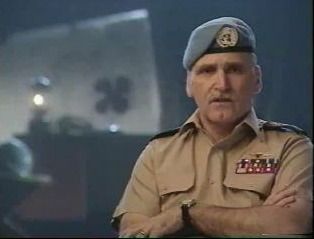In 1996, I got the toughest gig of my career – make a film to tell the behind-the-scenes story of the Rwandan genocide for Lieutenant General Roméo Dallaire. Though we could have focused on many things – like the failure of the UN to act, or the devastation of the Tutsi people and culture – Dallaire's mission was clear. He wanted the Canadian Armed Forces to start to acknowledge, treat and prevent PTSD (post-traumatic stress disorder).
This was my first gig for DND. Like most of my clients, they typically hired white men as writers and directors. So I felt the extra pressure to perform, to make sure I didn't give them any opportunity to say, "See, I told you a woman can't do this job".
Then, in our planning meeting, Dallaire raised the stakes through the roof. Looking down at me from his elevated platform, he locked his eyes on mine. "If you don't make the audience cry, you've failed." It was the only thing he said to me. But it was all I needed to commit fully to him and his cause.
Though I didn't tell anyone at the time, I definitely felt way over my head. Like most Westerners, I actually didn't know much about what had happened in Rwanda. And I definitely was not an expert on the military. So I had to do a crash course in secret to get up to speed – before the internet was really a thing.
Once I had a rough idea of the story, I sketched out a plan. We obviously couldn't go overseas to shoot anything; I'd have to make do with archives – from TV news networks and DND video teams that had been on the ground in the aftermath. Plus, I could shoot original interviews.
Though Dallaire gave me full access to his staff, it was tough to find interviewees (in French and English). The fact was that the world only had a few peacekeepers on the ground during the actual genocide. Less than a dozen were still serving and willing to share their stories.
Those who did have my deepest respect and gratitude. Because the interview process was brutal for them, reliving the horror of their experiences. One officer stopped mid-sentence and walked out - straight into treatment. Others told of the price they and their families had paid - failed marriages, career collapses, and suicide attempts - including several by Dallaire himself. They talked about how certain things trigger flashbacks for them now. The sound of snarling dogs reminds them of packs fighting over dead bodies. The sight of grilled chicken looks like a corpse. The smell of toast recalls the overpowering stench of burning flesh.
I did my best to do right by them. To be fully present. To listen deeply. To acknowledge their pain. I also offered lots of opportunities for them to quit. But in between tears and camera breaks, they all said the same thing. "No. I want to get it out. I want to help others. I want people to know."
Pulling the story together was difficult for me too, spending weeks working with truly gruesome footage. Somehow, I had to walk the balance between conveying the horror of what they went through, without being so graphic that viewers would shut down.
In the end, the message was clear. Most of his people weren’t psychologically prepared for what they experienced. And they didn’t get the mental health support they needed in the field.
I later heard that the film became mandatory viewing for everyone at DND and was featured by CBC as the true story of how the UN failed Rwanda unfolded. It helped trigger significant changes in the way our Armed Forces manage PTSD. And yeah, everyone cried, including me. I realized then that Dallaire was a genius. Not just for his military leadership. But because he knew that only the power of stories could have that kind of impact.
I have to give a huge shoutout to Director of Photography Karl Roeder and the fab team at Affinity Productions for helping to make this such a compelling story.
And my heartfelt thanks to all those who serve in the military around the world in so many different ways, to keep us safe, keep the peace, and protect our future.
Warning: Graphic content





